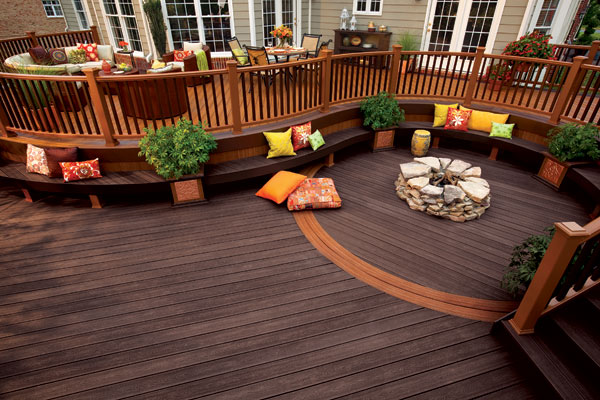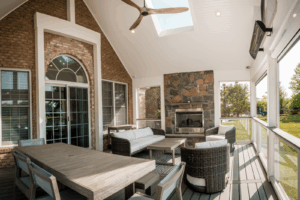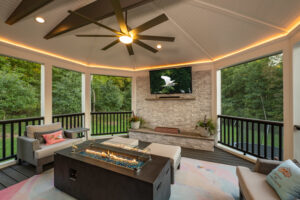You have many materials to choose from when you are building or repairing a deck. Wood, composites and PVC all offer different pros and cons. But there is a reason that so many professional contractors, like the design & build team here at DeckGuru, specialize in repairing decks using Trex materials.
So what’s special about Trex, and why do we trust it over the other products out there?
We can point to several reasons why Trex is superior to other brands on the market, but when it comes down to it, there’s one factor that matters most: quality. Trex decking was designed by combining two popular materials to make one great product. Qualities of wood give your deck strength and qualities of plastic protect it from moisture.
What makes Trex products different?
Trex has been in business for nearly 30 years, providing innovative products that are designed to last. Trex decking and railing products are made from a blend of wood, which is naturally decay-resistant, and plastic, which is moisture-resistant, to create an ideal balance between natural appeal and the protection you need. The design ensures that you can still enjoy the aesthetic benefits of a classic wooden deck while having a level of durability you’ll appreciate for years to come.
And did we mention Trex products are environmentally friendly too? Trex composite decking is created using reclaimed wood and recycled plastic, and the company is known to have one of the most eco-friendly manufacturing operations in the country.
So how does Trex really stack up against other popular decking materials?
Trex vs. Wood
Wood decks are quickly becoming a thing of the past. Composite decking is an investment in your future.
- It requires no painting, staining or sealing to maintain its vibrancy through each season.
- It stands up to the elements, eliminating decks that rot, warp and splinter.
- It is far more resistant to pest & insect infestations.
And on top of all those benefits, because they exclusively use reclaimed wood, Trex hasn’t cut down a single tree to make their decking boards – ever. And there’s nothing more natural than that!
Trex vs. PVC
PVC (which is the abbreviation for polyvinyl chloride) is also a low-maintenance alternative to wood that resists termites, rot and mold. But while Trex emulates the look and feel of wood, PVC decks will never give that same feeling of classic, luxurious wood.
- Extreme temperature changes can cause PVC to wrap more easily.
- Contact with sunscreen, bug repellent and even rubber mats have been known to cause discoloration on PVC decking boards.
- While it takes less upkeep than wood, it’s still not as low maintenance as Trex, as PVC decks have a more complicated cleaning process and are prone to chalking.
It’s also important to mention that PVC is completely synthetic and not eco-friendly. Trex board, on the other hand, uses 95% recycled materials in its manufacturing process.
And if that wasn’t enough, Trex also has a huge library of design options to choose from, including both smooth & textured woodgrain finishes, and over 15 different colors and tones to make sure the deck boards and railing complement the existing color scheme of your home.
There are so many benefits to building your deck using Trex materials. If you’re ready to find out if Trex is the right product for your home, contact the team at DeckGuru today to get your free estimate!





